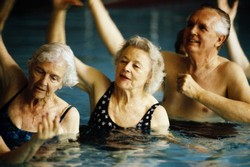Supporting assisted living for healthy ageing
EU-funded researchers worked to promote healthy ageing and improve facilities for the elderly with chronic conditions through work on the JADE(opens in new window) (Joining innovative approaches for the integration and development of transnational knowledge of clusters policies related to independent of Elderly) project. More specifically, they advanced a Common Research Agenda and Joint Action Plan (JAP) addressing one of the most promising cluster applications of ambient intelligence (AI) technologies: independent living services and telecare. To realise the potential of assistive technologies in caring for the elderly requires positive government policies and funding for their effective implementation. As such, the 42-member consortium emphasised optimal resource allocation to promote independence of the elderly and generally meet the needs of a healthy ageing population. The approach considered funding, policies, expertise, research and development, and technology deployment for ambient-assisted living. Clusters of assistive technologies were analysed to identify strengths and weaknesses relevant to smart living, telecare, telehealth and e-gov for the elderly. The JADE cross-analysis reports that assistive technologies can in part offer a solution to the challenge of providing health and care to Europe's growing elderly population. Research determined that a more national/international approach is needed to address clinician resistance, training and skills development, standards, and interoperability and integration between health and social care. The successfully validated JADE JAP facilitates mobilisation of funds, scientists, joint research projects and initiatives, and healthy ageing innovation laboratories. The approach supports faster commercialisation of innovative products. A white paper was drafted for Europe-wide application of AI to cater to the ageing population's health care needs. This covers policies and joint action plans for implementing 'Regional Programmes for Healthy Ageing' (RePHAs) at EU, national and regional levels. Project work also highlighted opportunities offered by innovative markets related to e-health for the elderly and potential cost savings for national and regional elderly health and care systems. The JADE white paper, Common Agenda and JAP all aim to foster regional economic development through more effective investments in research and training activities in AI applied to health care for the ageing. In tandem with project-developed measures, implementing supportive policies for e-health and assistive technologies will promote active and healthy ageing through optimised use of health and social care budgets.



